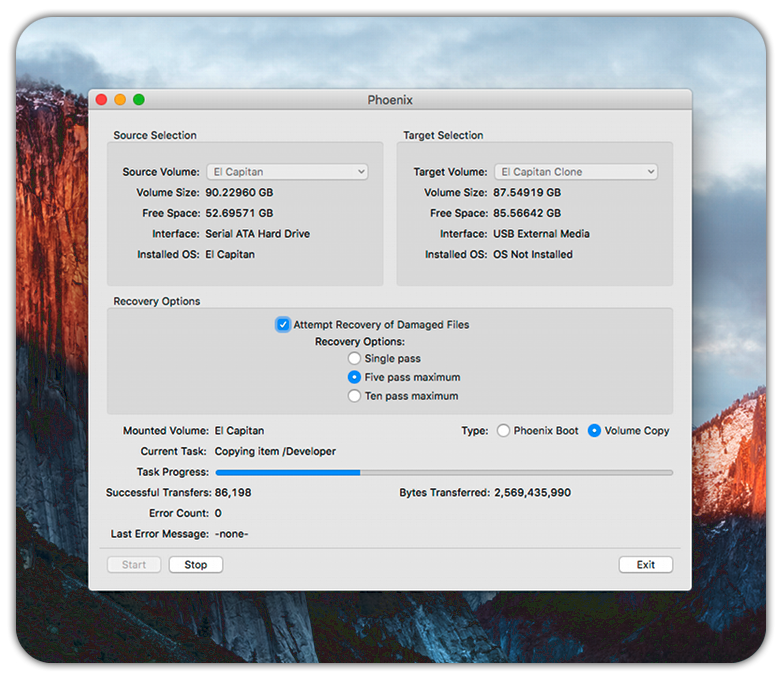
| Software and Computer Systems Company, LLC |

Version 2.3
Now Compatible with macOS 10.12, Sierra
What is Phoenix?
Phoenix is a tool designed to create operating system
images, perform volume copies (clones) from one hard drive
volume to another, and if possible recover damaged files from a
hard drive. With Phoenix, a user may do the following:
Why Use Phoenix?
Most people will use Phoenix for the following reasons:
System Requirements
Phoenix supports MacOS® versions 10.6 (Snow Leopard),
10.7(Lion), 10.8 (Mountain Lion), 10.9 (Mavericks), 10.10
(Yosemite), 10.11 (El Capitan), and 10.12 Sierra on Intel
platforms. Phoenix is intended to be used only with
standard MacOS formatted volumes, which can include internal and
external hard drives, Fusion Drives, and RAID units. It does not
support any other platforms or drive formats. As general rule,
if the volume shows up on your Mac as a regular non-networked
Mac volume, then it can be used by Phoenix as a source
or target.
Supported Intel based systems include all variants of the
MacBook, MacBook Air, MacBook Pro, iMac, Mac Pro, and Mac Mini.
A Phoenix Boot Volume will require a volume that has
typically at least 20GB of free space on it. The core OS
requirements will vary with the operating system. Newer
operating systems, such as MacOS 10.9 (Mavericks), 10.10
(Yosemite), and 10.11 (El Capitan) make use of a service known
as Icon Services Agent which can cause an initial extraction of
the OS to "grow" by several gigabytes as they generate icon
data. Please keep in mind that if you wish to update the
OS, the Phoenix Boot Volume will also require
additional space for downloaded update files.
Do not attempt to use Phoenix for bootlegging purposes!!
Aside from the fact that bootlegging is illegal, Phoenix
preserves a fair amount of low level system and user information
when it creates images. Many items such as passwords to online
banking accounts, network settings, and system and hardware
specific settings will remain intact in all images that Phoenix
creates. Attempting to use an image created by Phoenix
for illegal distribution will likely produce an image that may
not work properly on another system and will likely also contain
information that's likely not intended for distribution.
Images created by Phoenix should be used only on the
system they are created on.
Using Phoenix
Using Phoenix is incredibly easy. All the user needs to
do is select the source and target volumes from the drop down
menus on the user interface, select whether they want to do a
volume copy or create a Phoenix Boot Volume, set any
recovery options, and click on the Start button. That’s it! This
is illustrated in the following image of Phoenix cloning
a volume named "El Capitan" to another volume named "El Capitan
Clone."

As shown in the photo above, the option to attempt to recover
damaged files is selected. The drive used above is in good
condition and when Phoenix finished there were no
errors. However, if some bad files had been encountered Phoenix
would have made five attempts (set by the options shown above)
to try and recover the bad files. If the recovery option
succeeds, great - no data was lost! If it fails Phoenix
displays the name of the bad file in both it's log file and on
the display itself so you'll know which file(s) are bad, and
then continues to copy and/or recover all the rest of the data
on the drive. All operations with Phoenix are simple,
whether you’re creating a clone of your primary hard drive (or
any other drive, for that matter) or you’re creating a Phoenix
Boot Volume. That’s all there is to it!
Purchasing Phoenix
To purchase Phoenix click on the Buy Phoenix Now button
below. Phoenix can be purchased as a standalone product
or bundled with Scannerz with FSE-Lite or FSE.
Note: Phoenix is also included in the fully featured
versions of Scannerz.
Prices:
$13.95 For the Phoenix Standalone package
$39.95 For Scannerz with Phoenix, Performance Probe 2,
and FSE-Lite for Mac OS X
$49.95 For a Scannerz with Phoenix, Performance Probe 2, and
FSE for Mac OS X combined
bundle (save $9.95)


Scannerz, Scannerz Lite, FSE, FSE-Lite, Performance Probe 2, Phoenix, SpotOff, and Spot-O-Meter are Mac OS X universal binaries and support both 32 and 64 bit Intel based systems using Mac OS X versions 10.6 (Snow Leopard), 10.7 (Lion), 10.8 (Mountain Lion), 10.9 (Mavericks), 10.10 (Yosemite), 10.11 (El Capitan), and 10.12 (Sierra). Supported Intel based systems include all variants of the MacBook, MacBook Air, MacBook Pro, iMac, Mac Pro, and Mac Mini.